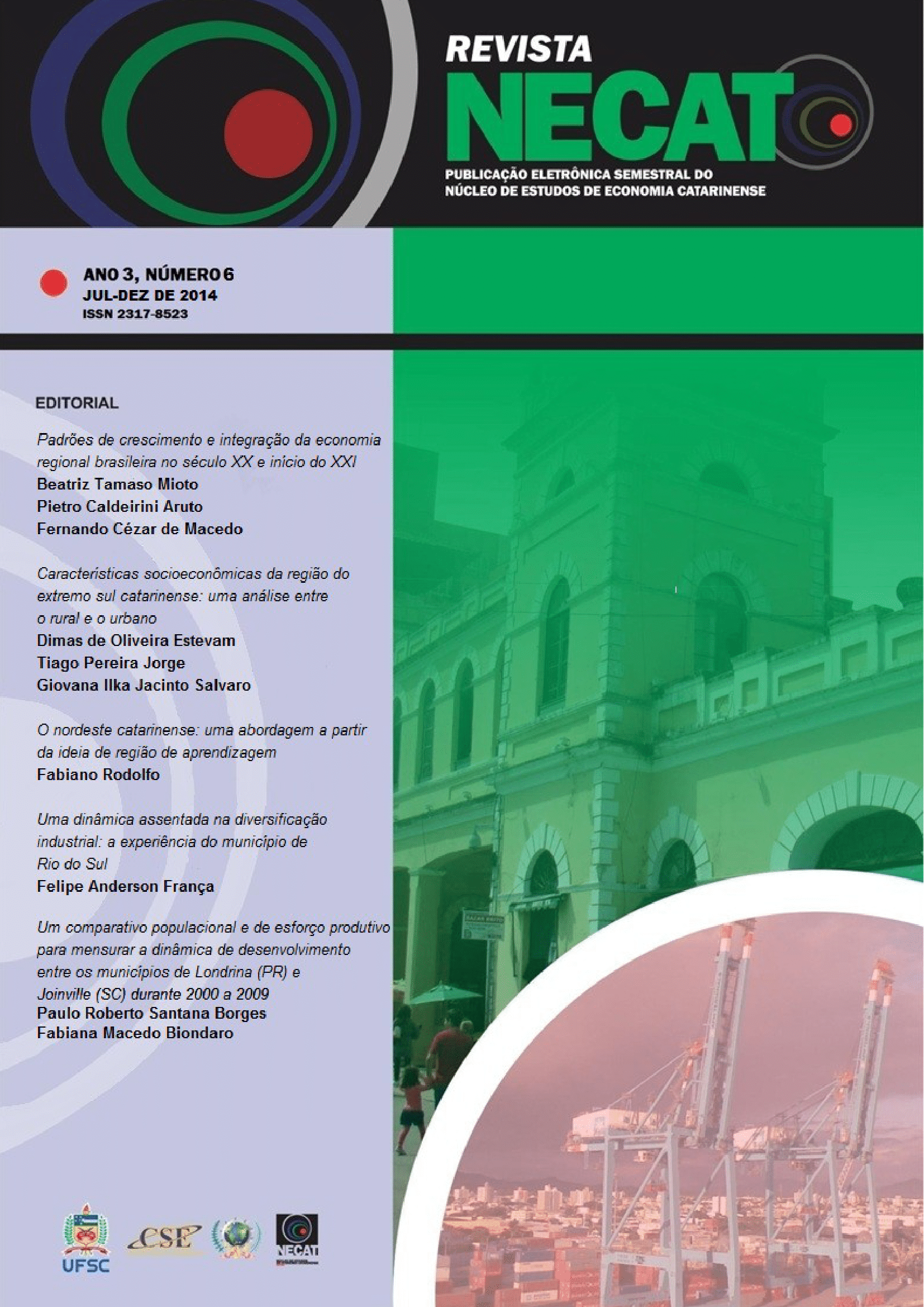De-industrialisation, ‘premature’ de-industrialisation and the dutch-disease
Palavras-chave:
De-industrialisation, Dutch-Disease, Latin AmericanResumo
Although the structure of employment has changed substantially over the long-term course of economic development, a drop of the scale and speed as the one that has taken place in manufacturing among industrialised and high middle–income countries in the last decades constitute an unprecedented phenomenon. In the analysis I distinguish between four sources of de-industrialisation, and develop a new concept of the ‘Dutch-disease’. I also offer a new approach to the understanding of ‘premature’ de-industrialisation, a phenomenon that has characterised Latin America since the beginning of the neo-liberal economic and political reforms, and conclude that it contains important components of policy-induced ‘uncreative destruction’. Finally, I discuss how rapid de-industrialisation has reopened an age-old debate in economic theory: is a unit value added in manufacturing equal to one in commodities, finance or services, especially in terms of its growth-enhancing properties?Referências
Aghion, P and P Howitt (1998), Endogenous Growth Theory, MIT Press.
Auty, R (ed.) (2001), Resource Abundance and Economic Development, OUP.
Corden WM and JP Neary (1982). ‘Booming sector and Dutch disease economics’, Economic Journal.
DiJohn, J (2007), The Political Economy of Late Industrialization in Oil-Exporting Countries, Penn University Press.
Kaldor, N (1967), Problems of Industrialization in Underdeveloped Countries, Cornell University Press.
Palma, JG (2000), ‘Trying to "tax and spend" oneself out of the Dutch-Disease’. The Chilean economy from the War of the Pacific to the Great Depression', in E Cárdenas, JA Ocampo and R Thorp (eds.) An Economic History of Latin America, Palgrave.
Palma, JG (2005), ‘Four sources of de-industrialisation and a new concept of the DutchDisease', in JA Ocampo (ed.) Beyond Reforms: structural dynamic and macroeconomic vulnerability, Stanford University Press and the World Bank.
Pérez, C (2002), Technological Revolutions and Financial Capital, Elgar.
Pesaran, H (1984), Macroeconomic policy in an oil-exporting economy with foreign exchange controls, Economica.
Pieper, U (2000), ‘De-industrialisation and the social and economic sustainability nexus in developing countries’, Journal of Development Studies.
Ros, J (2000), Development Theory and Economic Growth, University of Michigan Press.
Rowthorn, R (1994), ‘Korea at the Cross-roads’, CBR, Cambridge University, WP 11.
Rowthorn, R and J Wells (1987), De-industrialisation and Foreign Trade, CUP.
Rowthorn, R and R Ramaswamy (1999), ‘Growth, trade and deindustrialization’, IMF Staff Papers.
Sachs, JD and AM Warner (1997), ‘Natural resource abundance and economic growth’, HIID, Harvard University.
Singh, A (1987), ‘Manufacturing and De-industrialization’, The New Palgrave: A Dictionary of Economics, Macmillan.
Thirlwall, A (2002), The Nature of Economic Growth, Elgar. Woolcock, M, Pritchett L, and Isham J (2001), ‘The Social Foundations of Poor Economic Growth in Resource-Rich Countries’, In Auty, (2001).
Downloads
Publicado
Edição
Seção
Licença
Os autores manterão seus direitos autorais e concedem à revista apenas o direito de primeira publicação. O artigo será simultaneamente licenciado sob a Creative Commons Attribution License, permitindo seu compartilhamento com o devido reconhecimento de autoria e publicação inicial para esta revista.
Os autores ficam autorizados à assumir contratos adicionais, separadamente, visando distribuição não-exclusiva da versão publicada nesta revista (ex.: repositório (site)institucional, ou capítulo de livro), reconhecida a autoria e publicação inicial nesta revista.

